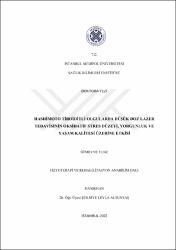| dc.contributor.advisor | Altuntaş, Şükriye Leyla | |
| dc.contributor.author | Tunç, Sümeyye | |
| dc.date.accessioned | 2023-10-19T11:22:01Z | |
| dc.date.available | 2023-10-19T11:22:01Z | |
| dc.date.issued | 2022 | en_US |
| dc.date.submitted | 2022-06-16 | |
| dc.identifier.citation | Tunç, S. (2022). Hashimoto tiroiditli olgularda düşük doz lazer tedavisinin oksidatif stres düzeyi, yorgunluk ve yaşam kalitesi üzerine etkisi. (Yayımlanmamış doktora tezi). İstanbul Medipol Üniversitesi Sağlık Bilimleri Enstitüsü, İstanbul. | en_US |
| dc.identifier.uri | https://tez.yok.gov.tr/UlusalTezMerkezi/tezSorguSonucYeni.jsp | |
| dc.identifier.uri | https://hdl.handle.net/20.500.12511/11619 | |
| dc.description.abstract | Araştırmamız Hashimoto Tiroiditi (HT) tanılı kişilerde levotiroksin replasman tedavisi ile kombine düşük doz lazer tedavisinin (DDLT) tiroid fonksiyonları, oksidatif stres (OS), yorgunluk ve yaşam kalitesi üzerindeki etkilerini incelemek amacıyla yapıldı. HT tanısı almış 46 hasta 3 hafta boyunca haftada iki kez, aktif DDLT (n=23) ve sham DDLT (n=23) almak üzere randomize edildi. Tedavi öncesi ve sonrası üçüncü ayda katılımcılar ağrı ve yorgunluk hissi, fiziksel aktivite düzeyi, el bileği kavrama kuvveti, yorgunluk seviyesi, uyku kalitesi ve uykululuk durumu, davranışsal durum ve yaşam kalitesi açısından değerlendirildi. Biyokimyasal parametreler, hekim tarafından rutin tetkik olarak talep edilen hasta dosyasından alındı. OS değerlendirmesinde oksidan stres göstergesi olan; Malondialdehit ve Nitrik Oksit, antioksidan kapasiteyi gösteren; Süperoksit Dismutaz, Katalaz, Glutatyon biyobelirteçleri kullanıldı. Total Antioksidan Kapasite ve Total Oksidan Seviye ölçülerek Oksidatif Stres İndeksi hesaplandı. Çalışmamızın sonucunda tedavi gruplarında ağrı ve genel yorgunluk hissinde, OS'yi gösteren oksidan ve antioksidan biyobelirteç düzeylerinde, yorgunluk düzeyinde, davranışsal durum ve yaşam kalitesinde anlamlı oranda düzelme saptandı (p<0,05). Her iki grupta da tedavi sonunda tiroid fonksiyonları ve otoimmünitesinde değişme olmadı (p>0,05). Aktif tedavi grubu sham kontrollü gruba göre ağrı ve genel yorgunluk hissi, fiziksel aktivite düzeyi, el bileği kavrama kuvveti, glutatyon düzeyleri, yorgunluk seviyesi, uyku kalitesi, gündüz uykululuk hali, davranışsal durum ve yaşam kalitesi değişkenleri açısından daha fazla iyileşme gösterdi. Sonuç olarak, çalışmamızda, HT'li hastalarda DDLT'nin sham grupla ile karşılaştırıldığında OS, klinik semptomlar ve yaşam kalitesi üzerinde daha etkili olduğu saptandı. DDLT'nin HT'li hastaların tedavisinde güvenli ve etkin şekilde kullanılabilecek bir yöntem olduğu sonucuna ulaşıldı. | en_US |
| dc.description.abstract | Our research was conducted to examine the effects of low-level laser therapy (LLLT) combined with levothyroxine replacement therapy on thyroid functions, oxidative stress (OS), fatigue, and life quality in people diagnosed with Hashimoto's Thyroiditis (HT). 46 patients diagnosed with HT have been randomised to receive active LLLT (n=23) and sham LLLT (n=23) twice a week for 3 weeks. Before and after the treatment, in the third month, participants were evaluated in terms of pain and fatigue, physical activity level, wrist grip strength, fatigue level, sleep quality and sleepiness status, behavioral status and life quality. Biochemical parameters were taken from the patient file requested by the physician as a routine examination. Malondialdehyde and Nitric Oxide indicating oxidant stress and Superoxide Dismutase, Catalase, Glutathione biomarkers showing antioxidant capacity were used in OS evaluation. Oxidative Stress Index was calculated by measuring Total Antioxidant Capacity and Total Oxidant Level. At the end of our study, a significant improvement in pain and general fatigue, oxidant and antioxidant biomarker levels showing OS, fatigue level, behavioral status and life quality was observed in the treatment groups (p<0.05). There was no change in thyroid functions and autoimmunity at the end of the treatment in both groups (p>0.05). The active treatment group showed more improvement in variables of pain and general tiredness, physical activity level, wrist grip strength, glutathione levels, fatigue level, sleep quality, daytime sleepiness, behavioral status and life quality compared to the sham-controlled group. As a result in our study, LLLT was found to be more effective on OS, clinical symptoms and quality of life in patients with HT compared to the sham group. It was concluded that LLLT is a safe and effective method that can be used in the treatment of patients with HT. | en_US |
| dc.language.iso | tur | en_US |
| dc.publisher | İstanbul Medipol Üniversitesi, Sağlık Bilimleri Enstitüsü | en_US |
| dc.rights | info:eu-repo/semantics/openAccess | en_US |
| dc.subject | Düşük Seviyeli Lazer Tedavisi | en_US |
| dc.subject | Hashimoto Tiroiditi | en_US |
| dc.subject | Oksidatif Stres | en_US |
| dc.subject | Otoimmünite | en_US |
| dc.subject | Yaşam Kalitesi | en_US |
| dc.subject | Yorgunluk | en_US |
| dc.subject | Autoimmunity | en_US |
| dc.subject | Fatigue | en_US |
| dc.subject | Hashimoto Thyroiditis | en_US |
| dc.subject | Low-Level Laser Therapy | en_US |
| dc.subject | Quality of Life | en_US |
| dc.subject | Oxidative Stress | en_US |
| dc.title | Hashimoto tiroiditli olgularda düşük doz lazer tedavisinin oksidatif stres düzeyi, yorgunluk ve yaşam kalitesi üzerine etkisi | en_US |
| dc.title.alternative | The effect of low-level laser therapy on oxidative stress level, fatigue and quality of life in patients with hashimoto thyroiditis | en_US |
| dc.type | doctoralThesis | en_US |
| dc.department | İstanbul Medipol Üniversitesi, Sağlık Bilimleri Enstitüsü, Fizyoterapi ve Rehabilitasyon Ana Bilim Dalı | en_US |
| dc.authorid | 0000-0002-0101-2738 | en_US |
| dc.relation.publicationcategory | Tez | en_US |
| dc.institutionauthor | Tunç, Sümeyye | |


















